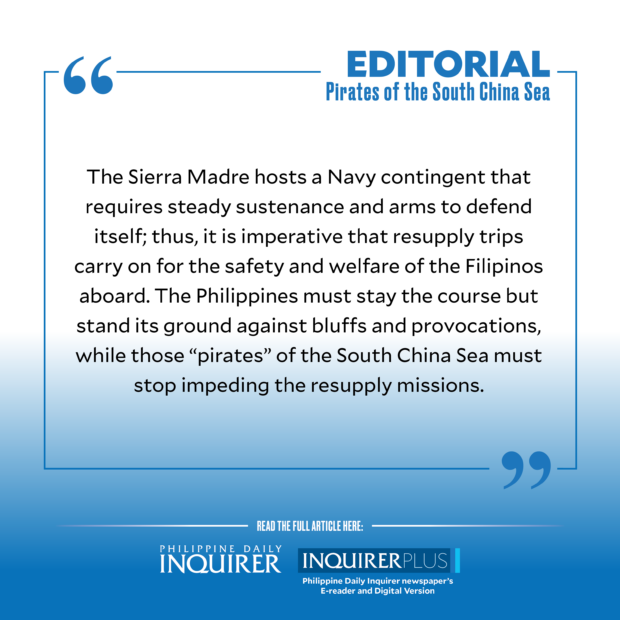
How quickly Filipinos’ anger turned into dismay and then indignation when the full picture of the disastrous June 17 Philippine resupply mission to Ayungin (Second Thomas) Shoal emerged several hours after the incident. That it took days for the Philippine military to release piecemeal details of the walloping its men suffered at the hands of the China Coast Guard (CCG) was a testament to its shame at being so brutalized.
It wasn’t the embarrassment of one caught doing wrong, nor the contrition that sometimes accompanies the commission of a crime, but the irrational guilt of one helpless and at the mercy of the wrongdoer.
In other words: a victim’s shame.
Most would agree that it would be foolish to declare war over a Filipino sailor’s severed finger, among the sundry injuries and indignities endured by Philippine Navy personnel on that day within our own waters.
China’s overwhelming force
But this does not mean turning the other cheek in the face of China’s overwhelming force in obstructing the Philippine mission to the BRP Sierra Madre, the grounded warship serving as a military outpost to protect the country’s claims to Ayungin.
Seaman First Class Jeffrey Facundo lost his right thumb during the incident that saw the Chinese brandishing bolos, pickaxes, knives, and other bladed weapons, not to mention their use of tear gas, sirens, and blinding lights, to forcibly board Philippine boats, disarm our sailors, and seize their disassembled firearms.
“For me, this is piracy already … because they boarded our boats illegally. They got our equipment. Again, they acted like pirates for what they did,” said the Armed Forces of the Philippines chief, Gen. Romeo Brawner Jr.
It was a grave humiliation, but not yet the level of an armed attack, as Malacañang took pains to assert on Friday. “Well, you know this was probably a misunderstanding or an accident,” Executive Secretary Lucas Bersamin said, using the language of abuse victims defending their tormentors.
It’s understandable that Malacañang would try to defuse the fires of outrage sparked by the injuries inflicted by the Chinese on our Navy men. After all, any admission that the Philippines had been the target of an armed attack would trigger its Mutual Defense Treaty with the United States, Manila’s last recourse in its cat-and-mouse game with Beijing.
‘Act of war’
Prematurely invoking the treaty with Washington would put pressure on the Philippine and US governments to take actions either of them is not yet prepared to take. China stands to gain by merely inciting fears among the populace that the Americans would not come to our aid as they had promised.
Reacting to the CCG’s actions against the Philippine Navy, Pentagon Press Secretary Maj. Gen. Pat Ryder reassured the Philippines last week that the United States would “continue to stand” by its security ally under the 1951 treaty.
But Manila cannot afford to rely only on a trusted friend’s word.
In May, President Marcos, speaking at the Shangri-La Dialogue in Singapore, said a death by a Filipino due to the maritime conflict would be seen by the government as something very close to an “act of war.”
Mr. Marcos, however, kept his counsel after the events of June 17, not acknowledging Facundo’s sacrifice nor the gallantry of the other servicemen until several days later. That suggested an understanding that the Navy personnel were not entirely blameless.
Last week’s mission had involved a novel approach to resupply the Ayungin detachment, according to AFP Western Command head Rear Admiral Alfonso Torres Jr. “It was my idea … As far as the schedule and the conduct of the operations, I am taking responsibility for that,” he said.
A purely Navy operation
Unlike earlier Ayungin missions led by the Philippine Coast Guard, this was a purely Navy operation using a chartered civilian vessel, the ML Lapu Lapu, instead of the smaller Unaizah May boats targeted by water cannons in the past.
In retrospect, it’s obvious that the Chinese would react badly to what they might perceive as a military operation in the contested waters. That they used nonlethal weapons instead of firearms spoke of their intentions, at least, to keep harm minimal.
Which is not to say they did not go overboard.
The Sierra Madre hosts a Navy contingent that requires steady sustenance and arms to defend itself; thus, it is imperative that resupply trips carry on for the safety and welfare of the Filipinos aboard. The Philippines must stay the course but stand its ground against bluffs and provocations, while those “pirates” of the South China Sea must stop impeding the resupply missions.
Breaking his silence on Sunday, Mr. Marcos said Manila was not in the business of instigating wars, as he vowed to “stay true to our Filipino nature … to settle all these issues peacefully.” Beijing must take heed, for no party will benefit from the eruption of violence in the South China Sea—not the United States, not the Philippines, and certainly not China.